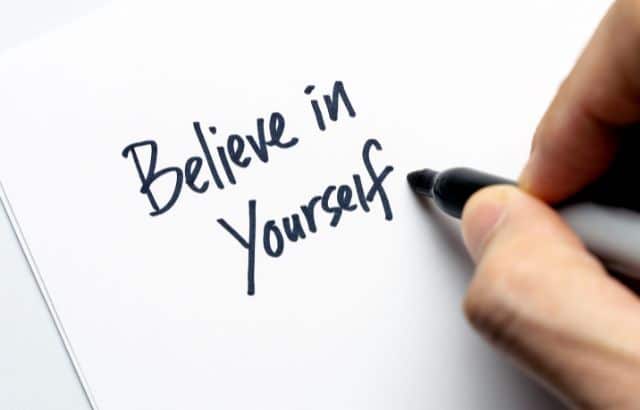Belief is a powerful catalyst for change. It is often said that confidence in oneself can influence how others perceive and respond to you. This principle is not merely a motivational idea; it is a practical strategy that can transform your personal and professional life. When you cultivate self-belief, you not only enhance your own potential but also inspire others to believe in you. Let’s explore how this dynamic works and look at some real-world examples to illustrate its impact.
Table of Contents
Self-Belief in Career Advancement

Firstly, consider the case of Sarah, a mid-level marketing manager at a tech company. Despite her expertise and achievements, Sarah struggled with self-doubt. This hesitation affected her performance and how her contributions were perceived by others. Recognizing the need to change, Sarah began to work on her self-belief. She started setting clearer goals, celebrating her small wins, and seeking feedback to continuously improve.
As Sarah’s self-confidence grew, so did her visibility within the company. Her newfound belief in her abilities led her to take on more challenging projects and to present innovative ideas during meetings. Her colleagues and superiors took notice. Within a year, Sarah was promoted to a senior role, a testament to how her belief in herself encouraged others to believe in her capabilities.
Leadership and Inspiring Teams

Furthermore, self-belief is crucial for effective leadership. Take the example of Raj, the founder of a startup that was struggling to gain traction. Raj had a clear vision but was initially unsure if his team would follow his lead. He decided to invest in his own self-belief by focusing on his strengths and staying committed to his vision.
Raj’s unwavering confidence was evident in his communication and actions. He faced setbacks with resilience and encouraged his team to stay motivated despite challenges. This confidence was contagious. His team began to mirror his belief, working more diligently and with greater enthusiasm. As a result, the startup started to gain momentum and eventually achieved significant milestones. Raj’s belief in himself had ignited a similar belief in his team.
Building Strong Personal Relationships

Moreover, self-belief extends to personal relationships as well. Consider Lisa, who had always been hesitant in social settings. She wanted to build stronger friendships but often felt insecure and out of place. Recognizing the need to change her approach, Lisa began working on her self-esteem by engaging in activities she enjoyed and celebrating her achievements.
With time, Lisa’s confidence grew. She started participating more actively in social events and expressing her opinions without fear of judgment. Her positive self-belief resonated with those around her. Friends and acquaintances began to view Lisa as approachable and reliable, leading to more meaningful and supportive relationships. Her belief in herself had transformed how others perceived her.
Overcoming Obstacles and Seizing Opportunities

In addition, self-belief can be instrumental in overcoming obstacles and seizing new opportunities. Take the case of Mark, an aspiring entrepreneur who faced numerous rejections from investors. Instead of letting these rejections deter him, Mark used them as learning experiences. He reinforced his belief in his business idea and continued refining his pitch.
Mark’s perseverance and confidence paid off when he finally secured funding from a major investor. His belief in his vision had not only driven him to improve but also convinced the investor of the potential success of his business. Mark’s journey highlights how self-belief can transform perceived failures into opportunities for growth.
Top Strategies for Success According to Hirav Shah
Expert Answers-Believe in yourself

What does it mean to believe in yourself?
Answer: Believing in yourself means having confidence in your abilities, values, and potential. It involves trusting that you can overcome challenges and achieve your goals despite obstacles and doubts.
How can self-belief impact my career?
Answer: Self-belief can positively impact your career by enhancing your confidence, increasing your visibility, and motivating you to take on new challenges. It can lead to better performance, recognition, and career advancement opportunities.
How does self-belief influence leadership?
Answer: Self-belief influences leadership by enabling you to lead with confidence and inspire your team. Leaders who believe in themselves are more likely to motivate their teams, drive innovation, and navigate challenges effectively.
Can believing in myself improve my personal relationships?
Answer: Yes, believing in yourself can improve personal relationships by increasing your confidence and authenticity. When you trust in your own value, you interact more positively with others, leading to stronger and more supportive relationships.
What are practical steps to build self-belief?
Answer: Practical steps to build self-belief include setting achievable goals, celebrating small successes, seeking constructive feedback, engaging in self-improvement activities, and maintaining a positive mindset.
Hirav Shah’s Best Quotes to Inspire Personal Growth

1. “Fear of rejection is the barrier between where you are and where you want to be.”
Explanations: Fear of rejection often prevents people from pursuing their goals and aspirations. It can paralyze decision-making and hinder progress, keeping you stuck in your current situation. Strategy: Confront and overcome your fear of rejection by gradually exposing yourself to situations where rejection is possible. This helps desensitize you to the fear and builds resilience. Execution: Apply for that job you think is out of reach, pitch your idea to potential clients, or ask for feedback on your work. Each step you take will help you grow more confident and diminish the power of fear.
2. “Confidence is the quiet force that propels you forward.”
Explanations: True confidence doesn’t need to be loud or boastful. It’s the subtle, internal strength that drives you to take action and make progress toward your goals. Strategy: Focus on building a solid foundation of skills and knowledge to support your confidence. Let your competence speak for itself rather than relying on external validation. Execution: Develop expertise in your field through continuous learning and practice. As your knowledge grows, so will your confidence, which will naturally influence how others perceive your capabilities.
3. “Belief in yourself is the first step towards inspiring others.”
Explanations: When you believe in your own potential, it sets a powerful example for others. Your self-confidence can inspire those around you to believe in your vision and support your endeavors. Strategy: Demonstrate your belief through action. Show dedication to your goals and maintain a positive attitude, even when facing challenges. Execution: Lead a project with conviction, share your vision with enthusiasm, and remain committed despite setbacks. Your commitment will encourage others to align with your goals and support you.
4. “Self-belief transforms doubt into opportunity.”
Explanations: Self-belief can turn moments of uncertainty into opportunities for growth. When you trust in your abilities, you’re more likely to see challenges as chances to improve rather than insurmountable obstacles. Strategy: Embrace challenges as opportunities for development. Approach problems with a mindset focused on solutions and learning rather than fearing failure. Execution: When faced with a difficult situation, analyze it for potential lessons and improvements. For example, if a project doesn’t go as planned, use the experience to refine your approach and strengthen your skills.
5. “Your belief in yourself is a powerful tool for success.”
Explanations: Self-belief acts as a driving force that propels you towards success. It empowers you to set ambitious goals, persevere through difficulties, and achieve your desired outcomes. Strategy: Cultivate a strong sense of self-belief by setting clear, achievable goals and reflecting on your past successes. Regularly remind yourself of your capabilities and potential. Execution: Create a vision board with your goals and milestones. Regularly review and adjust your plans as needed, celebrating your achievements along the way to reinforce your self-belief and maintain motivation.
Conclusion

In summary, believing in yourself is more than just a personal asset; it’s a powerful force that can influence how others view and respond to you. Whether in career advancement, leadership, personal relationships, or overcoming obstacles, self-belief plays a crucial role in inspiring confidence in others. By cultivating a strong sense of self-belief and demonstrating it through actions and decisions, you create a ripple effect that encourages those around you to believe in your potential. So, invest in your self-belief, and watch as others start believing in you too.










